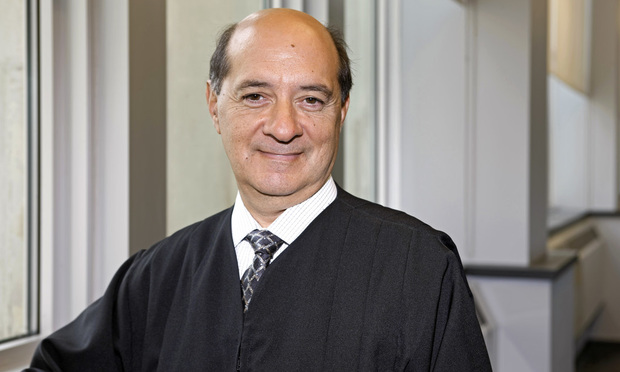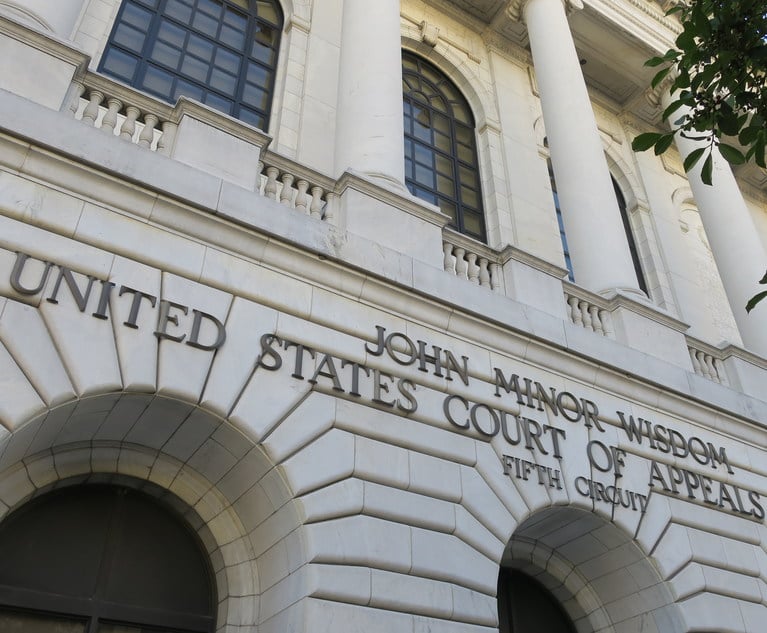Appeals Court Gives State Bigger Tax Bite of Whistleblower Awards
A whistleblower who was awarded $1.2 million in a False Claims Act suit must pay state taxes on the entire amount of the award, even if the amount paid in legal fees and portions of the proceeds were shared with other relators, a New Jersey appeals court ruled Thursday.
February 08, 2018 at 04:05 PM
5 minute read

A whistleblower who was awarded $1.2 million in a False Claims Act suit must pay state taxes on the entire amount of the award, even if the amount paid in legal fees and portions of the proceeds were shared with other relators, a New Jersey appeals court ruled Thursday.
Anthony Kite, who filed a whistleblower suit accusing several hospitals of overbilling Medicare by as much as 400 percent, was able to deduct his legal fees for the case from his federal income taxes. But he must pay state taxes on the entire, $1,229,255 share of the proceeds in the case, the appeals court said in Kite v. Director, Division of Taxation.
Kite is set to end up with less than half of that award—$553,164—after paying $386,776 in legal fees and $307,313 to other relators in the case.
But Patrick DeAlmeida, who is now in the Appellate Division but handled Kite's case as presiding judge of the Tax Court of New Jersey, found that proceeds of Kite's whistleblower suit met the definition of taxable gross income, and are not entitled to a statutory tax exemption for damages received in a suit as a result of personal injuries or illness.
Noting that litigation proceeds based on personal injuries or sickness are subject to a statutory exemption from state taxes, DeAlmeida said the exclusion shows the Legislature intended that other types of payments from litigation, such as damages from a qui tam case, are considered an award and are subject to taxation. DeAlmeida also noted that the FCA also expressly refers to proceeds of a qui tam suit or settlement as an “award.”
On appeal, Kite contended that his recovery did not constitute taxable gross income because it did not meet the statutory definition of a prize or award under state tax law. He also asserted that if the recovery were found subject to taxation, he should be allowed to deduct his legal fees for prosecuting the case and the amounts he paid to other relators.
But Judges Joseph Yannotti, Harry Carroll and George Leone of the Appellate Division agreed with DeAlmeida. Kite argued that his recovery is not a taxable prize or award because a prize is offered in a competition or game of chance and an award is conferred especially based on merit or need. But Yannotti wrote for the court that “plaintiff's interpretation of the word 'award' is unduly narrow” and “inconsistent with the ordinary meanings of that word.”
Kite also claimed that the state tax statute illustrates the Legislature's intention to tax income after credit is given for expenses and costs incurred in their generation. But the appeals court cited DeAlmeida's assertion that, of 16 categories of income referenced in state statutes, only a few are described as net income.
Kite also argued that public policy considerations should allow him to deduct his attorney fees from his recovery. He said that if the tax burden is too high, would-be relators would not pursue such claims. “We note that the federal taxation of qui tam awards has not discouraged relators such as plaintiff from pursuing them,” the panel said.
Kite was working as a financial consultant to hospitals in 2004 when he detected what he deemed to be a pattern of fraudulent behavior by some of them. He asserted that they were submitting claims to Medicare for routine procedures at costs that were inflated by as much as 400 percent.
He filed his FCA suit in 2005. He later learned that two other suits had been filed with claims against some of the same hospitals that he targeted in his suit. In 2006, he entered into a revenue-sharing agreement with the relators in the other actions, in which they agreed to work together and to share any proceeds of their litigation. In 2008, Kite entered into settlement agreements with three hospital defendants.
Steven Janel, the Pennington, New Jersey, attorney who represented Kite in the tax dispute, said he and his client would “weigh our options” concerning the ruling, which he called “a difficult result.”
Janel said the opportunity for whistleblowers to realize a financial gain from bringing a qui tam case is “supposed to encourage people to come forward and report wrongdoing. Any type of legislation which reduces that amount will discourage people from coming forward,” he said, adding, “Somebody's going to take a long, hard look at bringing one of these.”
Assistant Attorney General Jason Rockwell and Deputy Attorney General Ramanjit Chawla represented the state. The Attorney General's Office referred a request for comment to the Department of the Treasury, which did not respond to a reporter's inquiry about the case.
This content has been archived. It is available through our partners, LexisNexis® and Bloomberg Law.
To view this content, please continue to their sites.
Not a Lexis Subscriber?
Subscribe Now
Not a Bloomberg Law Subscriber?
Subscribe Now
NOT FOR REPRINT
© 2025 ALM Global, LLC, All Rights Reserved. Request academic re-use from www.copyright.com. All other uses, submit a request to [email protected]. For more information visit Asset & Logo Licensing.
You Might Like
View All
Legal Issues to Watch in the US Appeals Courts in 2025


'Point Us to the Plain Language': NJ Supreme Court Grills Defense Statutory Requirements for Affidavit of Merit
5 minute read
3rd Circuit Judges Zero In on Constitutional Challenges to Medicare Drug Pricing Program
Trending Stories
- 1'It's Not Going to Be Pretty': PayPal, Capital One Face Novel Class Actions Over 'Poaching' Commissions Owed Influencers
- 211th Circuit Rejects Trump's Emergency Request as DOJ Prepares to Release Special Counsel's Final Report
- 3Supreme Court Takes Up Challenge to ACA Task Force
- 4'Tragedy of Unspeakable Proportions:' Could Edison, DWP, Face Lawsuits Over LA Wildfires?
- 5Meta Pulls Plug on DEI Programs
Who Got The Work
Michael G. Bongiorno, Andrew Scott Dulberg and Elizabeth E. Driscoll from Wilmer Cutler Pickering Hale and Dorr have stepped in to represent Symbotic Inc., an A.I.-enabled technology platform that focuses on increasing supply chain efficiency, and other defendants in a pending shareholder derivative lawsuit. The case, filed Oct. 2 in Massachusetts District Court by the Brown Law Firm on behalf of Stephen Austen, accuses certain officers and directors of misleading investors in regard to Symbotic's potential for margin growth by failing to disclose that the company was not equipped to timely deploy its systems or manage expenses through project delays. The case, assigned to U.S. District Judge Nathaniel M. Gorton, is 1:24-cv-12522, Austen v. Cohen et al.
Who Got The Work
Edmund Polubinski and Marie Killmond of Davis Polk & Wardwell have entered appearances for data platform software development company MongoDB and other defendants in a pending shareholder derivative lawsuit. The action, filed Oct. 7 in New York Southern District Court by the Brown Law Firm, accuses the company's directors and/or officers of falsely expressing confidence in the company’s restructuring of its sales incentive plan and downplaying the severity of decreases in its upfront commitments. The case is 1:24-cv-07594, Roy v. Ittycheria et al.
Who Got The Work
Amy O. Bruchs and Kurt F. Ellison of Michael Best & Friedrich have entered appearances for Epic Systems Corp. in a pending employment discrimination lawsuit. The suit was filed Sept. 7 in Wisconsin Western District Court by Levine Eisberner LLC and Siri & Glimstad on behalf of a project manager who claims that he was wrongfully terminated after applying for a religious exemption to the defendant's COVID-19 vaccine mandate. The case, assigned to U.S. Magistrate Judge Anita Marie Boor, is 3:24-cv-00630, Secker, Nathan v. Epic Systems Corporation.
Who Got The Work
David X. Sullivan, Thomas J. Finn and Gregory A. Hall from McCarter & English have entered appearances for Sunrun Installation Services in a pending civil rights lawsuit. The complaint was filed Sept. 4 in Connecticut District Court by attorney Robert M. Berke on behalf of former employee George Edward Steins, who was arrested and charged with employing an unregistered home improvement salesperson. The complaint alleges that had Sunrun informed the Connecticut Department of Consumer Protection that the plaintiff's employment had ended in 2017 and that he no longer held Sunrun's home improvement contractor license, he would not have been hit with charges, which were dismissed in May 2024. The case, assigned to U.S. District Judge Jeffrey A. Meyer, is 3:24-cv-01423, Steins v. Sunrun, Inc. et al.
Who Got The Work
Greenberg Traurig shareholder Joshua L. Raskin has entered an appearance for boohoo.com UK Ltd. in a pending patent infringement lawsuit. The suit, filed Sept. 3 in Texas Eastern District Court by Rozier Hardt McDonough on behalf of Alto Dynamics, asserts five patents related to an online shopping platform. The case, assigned to U.S. District Judge Rodney Gilstrap, is 2:24-cv-00719, Alto Dynamics, LLC v. boohoo.com UK Limited.
Featured Firms
Law Offices of Gary Martin Hays & Associates, P.C.
(470) 294-1674
Law Offices of Mark E. Salomone
(857) 444-6468
Smith & Hassler
(713) 739-1250






